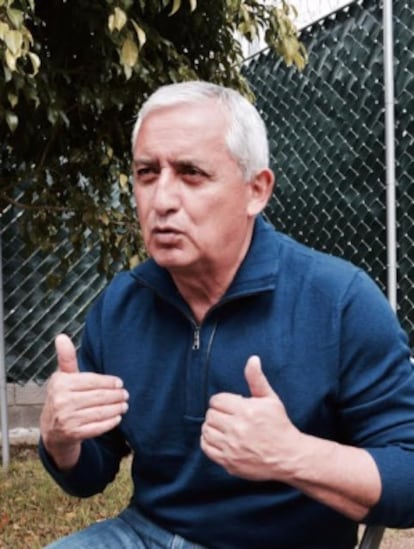Guatemala’s jailed ex-leader: “I didn’t want any deaths just to save my skin”
Otto Pérez Molina blames Washington for his downfall in an alleged customs bribery case


Until recently, Otto Pérez Molina was the president of Guatemala. Today, he is inmate number one at the Mariscal Zavala military prison where he is awaiting his trial on corruption charges.
Elected in 2012, the retired military general was removed from office and accused earlier this year of illicit association with criminal groups, passive bribery and customs fraud in relation to an alleged scheme involving money collected at Guatemala’s customs houses, organized by government officials.
The indictment was issued by the International Commission against Impunity in Guatemala (CICIG), a UN-sponsored body that serves as an anti-public corruption prosecuting panel and is headed by Pérez Molina’s nemesis, Colombian Judge Iván Velásquez.
According to the commission, Pérez Molina directed a massive scheme in which government import taxes were eliminated for companies on their products coming from abroad in exchange for big payoffs. The case is known as La Línea (the line).
The disgraced former president has denied all the charges but he stands alone. He has lost the support of the people, who held large street protests over the spring and summer demanding his resignation. Then the prosecutors closed in, and his own party shunned him.
The important thing is to face up to the charges and the truth will come out little by little”
Congress also refused to back him and lifted his immunity so that he could be prosecuted. On September 2, Pérez Molina resigned. The following day he was arrested.
Question. Many Guatemalans view your imprisonment as a victory for democracy. In other words, the institutions were capable of putting a president behind bars.
Answer. It all depends on the way you want to look at it. Putting a president in jail creates a lot of expectations. But if you look at the way it was done and who was behind all this, there are many questions that will be raised.
Q. You blamed the United States, the CICIG and the attorney general for this. But don’t you think you stand alone in your accusations?
A. Even if I was alone, the important thing is to face up to the charges, and the truth will come out little by little.
Q. Do you trust the judicial system?
A. If I wanted to escape justice, I would have prepared a way out. But I am here and I went before a judge.
Q. Had you thought about going into exile?
A. I could have done it, but that wasn’t what I was looking for. I wanted to clear up this situation. Even though the circumstances have grown difficult, I am willing to go on waging my battle.
The attorney general became a tool of the CICIG and, at the same time, the United States”
Q. The indictment against you is very serious. It alleges association with criminals, passive bribery and customs fraud. Prosecutors have 89,000 telephone calls that were intercepted, 75,000 documents, and 6,000 emails. Do you really think you will go free?
A. If there is justice, yes. They mention 89,000 calls but there is only one they have against me and it doesn’t prove that I committed any crime. They are charging me with customs fraud, but it’s impossible for a president to be charged with that because I am neither a public servant nor a fraudster. There is also no proof of illicit criminal association, and the bribery charge depends on a witness who will admit that he never gave me one cent. I am here because of ambition, self-centeredness, and the opportunity of advancement by Commissioner Iván Velásquez.
Q. But you accepted him in that post.
A. I wouldn’t do that again.
Q. Even though you are attacking the commissioner, the attorney general has backed up the indictment.
A. This is something I can’t quite understand. I picked her from six candidates, and I had a good relationship with her. But something changed. The Attorney General’s Office became a tool of the CICIG and, at the same time, the United States.
Q. What interests does Washington have?
A. The interest of the United States is to extend its presence to stop Nicaragua and Venezuela. But also because the Chinese and Russians are building up their own interests in the region.
Q. But not only was Judge Velásquez against you, polls over the last months showed you had an 88% disapproval rating and scores of people poured out into the streets against your government.
A. Look, if we had wanted to, we could have organized an even larger protest, which would have ended up in confrontation. And I assure you that would have been the end of the protest rallies.
Q. But these were just citizens who were trying to peacefully express their dissatisfaction with the government.
A. The United States was behind all of this – sending messages [on social media] to rouse the people. But I didn’t want any more polarization. We emerged from an internal armed conflict that lasted 36 years. I lived through it, and I was one of the signatories of the peace treaty. I didn’t want to create a situation that would have caused more deaths just to help myself.
English version by Martin Delfín.
Tu suscripción se está usando en otro dispositivo
¿Quieres añadir otro usuario a tu suscripción?
Si continúas leyendo en este dispositivo, no se podrá leer en el otro.
FlechaTu suscripción se está usando en otro dispositivo y solo puedes acceder a EL PAÍS desde un dispositivo a la vez.
Si quieres compartir tu cuenta, cambia tu suscripción a la modalidad Premium, así podrás añadir otro usuario. Cada uno accederá con su propia cuenta de email, lo que os permitirá personalizar vuestra experiencia en EL PAÍS.
¿Tienes una suscripción de empresa? Accede aquí para contratar más cuentas.
En el caso de no saber quién está usando tu cuenta, te recomendamos cambiar tu contraseña aquí.
Si decides continuar compartiendo tu cuenta, este mensaje se mostrará en tu dispositivo y en el de la otra persona que está usando tu cuenta de forma indefinida, afectando a tu experiencia de lectura. Puedes consultar aquí los términos y condiciones de la suscripción digital.








































